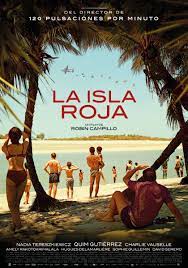
RED ISLAND
Belgium, Madagascar, 2023, 117 minutes, Colour.
Nadia Tereszkiewicz, Quimi Gutierrez, Charlie Vauselle, Alemy Ramotoarimalala, Hugues Delamarliere, Sophie Guillemiin, Romero, Vincent Schmidt.
Directed by Robin Campillo.
The Island of this film is Madagascar.
Audiences outside Africa and outside France may not be familiar with the colonial history of Madagascar. This film throws light on 20th century history, colonial France, the local people and their rebellions and repression, the moves for independence.
The writer-director, Robin Campillo (Eastern Boys, 24 MBH) draws on his own experiences in Madagascar. The setting is 1971-1972, a period of colonial occupation, uprisings, shift of policy on the part of France, a withdrawal of occupying forces.
For most of the film, there is a summer, holiday spirit, focusing on families where the fathers are stationed in Madagascar, military, pilots… The film creates a happy family atmosphere, meals together, swimming in the summer, dancing, jollity. While the film does focus on the adults, there is an eight-year-old boy, Thomas (Charlie Vauselle), rather withdrawn, prone to be absorbed in comic books, especially Fantomas (and the film frequently bringing these cartoon activities to animated life). Thomas observes, becomes friendly with little girl who loves the comic as well, bonds with her, at school, during the holidays.
While the film does show the perspective of children in the situation, there is also a focus on the adults, happiness and tensions within families, parents and children, husbands and wives. There is also a focus on a young Frenchman who has bought his new wife to Madagascar, she feeling lonely and isolated, returning to France, he becoming involved with a prostitute at the local brothel. There is also a focus on these women, working in laundries and packing, at one stage the group invading the military centre and beating the soldiers.
There are also military episodes, flights, commanders, indications of the uprisings, the military confrontation of the rebels.
So, while the audience may have enjoyed this perspective on Madagascar, the last 20 minutes may put response awry, the preparation of the French to leave, to go back to France, rebels being released, coming back to the town, proclaiming their bids for freedom with great vigour, the film then ending with them singing, the French withdrawing, a freedom for Madagascar. So, dramatically, the film symbolises the situation, the presence of the French, the influence, domination, and their departure and disappearance – leaving the local people, leaving them centre screen for the audience.
- Title? Madagascar? The red dust?
- Audience knowledge of Madagascar and its colonial experiences? The presence of the French? The aim of the colonials to make the local people French in consciousness, language and style? 20th century colonialism? The moves for independence and freedom?
- The main focus of the narrative on the families, the summer holidays, relaxation and enjoyment, meals, the beach, dancing, joviality? The background of the airbase? Planes and flights? The other officials? The offices dining room and staff? Hierarchy? These attitudes taken for granted?
- The focus on Thomas, aged eight, reclusive, in the box, peering through the cracks, his reading the comics, love for Fantomas, the visual re-enactments throughout the film, the animation and its style, the stories? Thomas and his place in the family, his older brothers, his father sometimes referring to him as a sissy? The mother and her care for her children? The older boys, mischief? The other families, the exuberant father and his joking and dancing, the happy mother, the daughter and her ballet? Meals, jovial, discussions?
- Thomas, meeting the little girl, their bonding, through the comic, sharing their experiences? And with her parents?
- Bernard, newly arrived from France, his wife, pale, uncomfortable, lonely, homesick, her participating in the meals, dancing? The departure? Bernard, going to the brothel, the encounter with the woman, the later meetings, taking her to the officers’ mess, the official permitting them to be there? His having to depart? Her attitude?
- Details of family life, the central family, father and his strictness, Pilate, his missions, aggravated, coming down? With his children? The mother, loving her children, the international travel, watching her husband flirt? The reconciliations? Thomas and the buying of the pearls, the father designing the ring, the birthday present, the mother relishing it? A realistic picture of family happiness and tensions?
- The colonial situation, the commanders, attitudes towards the local people, making them French, the rebels, imprisonment, the indication of rebels thrown from the planes to their deaths?
- The change in situation, the French withdrawing, preparations for the departure, the effect on each of the characters?
- The departure and the change of tone of the film? The literal departure of the family from the film?
- The return of the rebels, the vigorous speeches, history, freedoms, the young woman from the brothel, her singing, everybody singing and relish freedom? The end of colonialism?